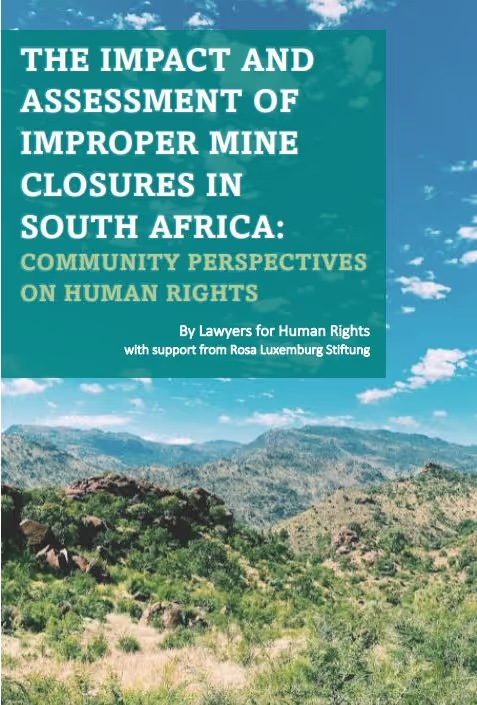For a century and a half, the unique geological formation of the land that today makes up the Republic of South Africa has been a treasure trove for the country and the world. The rapid economic and political development of the country from pre-colonial farming societies to colonies to a modern industrial state was linked, and driven mainly, by the mining industry. Understanding South Africa’s modern-day society is dependent on understanding the legacy of mining which has so profoundly shaped the country. This legacy is intertwined with exploitation and extraction not just of the land, but of the labour of its people. Stories of colonial subjugation, mass community land dispossession, poverty wages of black migrant labourers, and racist segregation against the black majority have historically both stemmed from and contributed to the mining industry. These stories continue to have an impact on both the environmental and socio-economic rights of mining-affected communities. Specifically, the spatial planning and landscape set up by apartheid-era policies ensure that the worst effects of mining and improper mine closure are felt by poor black communities across the country. Thus, LHR has collated critical, first-hand accounts of improper mine closure crisis, community views on and their perspectives of how it should have been managed, and research on best practices - into a research report - in order to advocate for specific changes within the gaps around the policy space around the dire impact of improper mine closures.
This report is based on qualitative research on the reality of communities’ struggles for mining justice in South Africa. Qualitative research allows for a holistic study of community experiences, struggles, and movements without resorting to statistical procedures or other means of quantification. As a point of departure, the report details human rights violations as experienced by communities in the context of mine closures, as well as their perspectives on and alternatives to these violations. The main source of data for this report comes from consultations on the lived realities of communities and their representatives at local and national levels and supporting organisations. To supplement these experiences, the report relies on existing literature and research reports as well as Lawyers for Human Rights work on issues related to mining-affected communities and improper mine closure. The design of the research is both descriptive and explanatory in nature. The report seeks to illustrate the issues facing mining communities affected by closures as well as to provide human rights-based legal and social analyses on the causes of and potential solutions to these issues.
The first purpose of the report is to consolidate and record these experiences and views, in acknowledgement of the importance of amplifying community voices and lived realities, in order to call attention to the magnitude of the impending crisis and what it means for communities; prompt a policy shift by the South African government to address the human rights consequences of these closures, including by tightening legal loopholes, clarifying and expanding existing legislation, and proactively addressing the issue; export the lessons of the South African closure experience to the broader, mineral-rich region in order to shift minerals and mining policy in other, less-advanced mining jurisdictions, on the continent.
Moreover, the report ultimately seeks to demonstrate the failure of the promise of South Africa’s Minerals and Petroleum Resource Development Act (MPRDA) to sustainably uplift mining-affected communities, given the thousands of individuals left behind in the aftermath of closure, and to highlight a better way forward for government and regional bodies in respect of the conclusion of the extractive industry business cycle. The report is premised on the obligation of the state and business to ensure the promotion of, respect, and protection of human rights at all stages of mining operations through post-closure, and to promote commitment by the state to this approach through revision of its legal framework and enforcement efforts.




.png)

